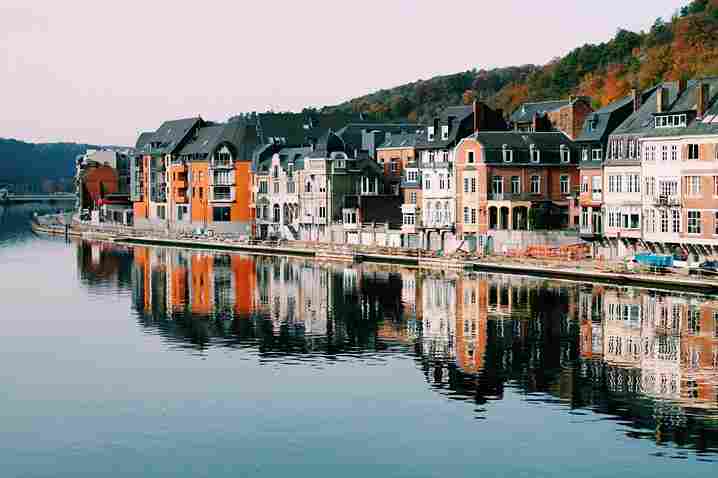
Belgium
Explore Belgium
Belgium
Belgium: A European Gem of History, Chocolate, and Culture
Belgium is a captivating blend of medieval charm, cosmopolitan cities, and culinary delights. Known for its world-famous chocolates, beer, and waffles, the country is also home to stunning architecture, historic battlefields, and the European Union’s headquarters. Whether you're exploring the fairytale streets of Bruges, enjoying the lively atmosphere of Brussels, or savoring a Trappist beer in the Ardennes, Belgium is a must-visit for history lovers, foodies, and culture seekers alike.
Learn More
Frequently Asked Questions: Belgium
Belgium offers unique experiences in every season:
- April–June (Spring):Best for mild weather, blooming flowers, and fewer tourists.
- July–August (Summer):Ideal for festivals, long daylight hours, and outdoor dining.
- September–November (Fall):Great for autumn colors, beer festivals, and fewer crowds.
- December–February (Winter):Perfect for Christmas markets, festive lights, and cozy cafés.
- Brussels:The capital city, home to the Grand Place, Atomium, and European Parliament.
- Bruges:A fairytale town with canals, cobblestone streets, and medieval architecture.
- Ghent:A lively city known for its castle, canals, and vibrant nightlife.
- Antwerp:A stylish city famous for diamonds, fashion, and baroque art.
- Battlefields of Flanders:A historical site honoring World War I history.
- Waterloo:The site of Napoleon’s final defeat in 1815.
- Dinant:A scenic riverside town known for its cliffside citadel and saxophone heritage.
- Leuven:A university town with stunning Gothic buildings and lively beer culture.
- Mechelen:A hidden gem with a rich history and beautiful architecture.
- Ardennes:A region of rolling hills, castles, and outdoor adventures.
- Atomium:An iconic structure offering panoramic views of Brussels.
- Gravensteen Castle:A medieval fortress in the heart of Ghent.
- Belgian Waffles:Light and crispy, served with powdered sugar or topped with chocolate and fruit.
- Moules-Frites:Mussels cooked in white wine, served with crispy fries.
- Belgian Fries:Thick-cut fries served with a variety of dipping sauces.
- Chocolate:World-renowned Belgian chocolate from famous chocolatiers like Neuhaus, Godiva, and Leonidas.
- Speculoos:A spiced shortcrust biscuit, often served with coffee.
- Carbonnade Flamande:A rich Flemish beef stew made with beer.
- Stoofvlees:A hearty beef and onion stew, typically served with fries.
- Waterzooi:A creamy fish or chicken stew originating from Ghent.
- Grey Shrimp Croquettes:A crispy snack filled with tiny North Sea shrimp.
- Trappist Beer:World-famous Belgian beers brewed by monks in monasteries.
- Flights:Arrive at Brussels Airport (BRU), the main international gateway.
- Trains:The Belgian rail system is excellent for traveling between major cities.
- Trams & Buses:Public transportation is efficient in cities like Brussels, Antwerp, and Ghent.
- Bicycles:Many cities, including Bruges and Ghent, are bike-friendly.
- Car Rentals:Recommended for exploring the Ardennes and rural areas.
- Walking:Most historic centers are pedestrian-friendly and best explored on foot.
- For EU travelers:No visa required.
- For U.S. travelers:No visa required for stays up to 90 days.
- For international travelers:Check Belgium’s visa requirements based on your nationality.
- Schengen Visa:Required for travelers from certain countries.
- Currency:Euro (EUR).
- Credit cards:Widely accepted, especially Visa and Mastercard.
- ATMs:Available throughout the country with fair exchange rates.
- Cash:Useful for small cafés, markets, and tipping.
- Dutch, French, and Germanare the official languages, depending on the region.
- English is widely spoken,especially in tourist areas and major cities.
- Most signs, menus, and tourist information are available in English.
- Belgium is a multilingual country,so be mindful of the language spoken in different regions.
- Tipping is not mandatorybut is appreciated for good service.
- Public transport etiquette:Let passengers exit before boarding and keep noise levels low.
- Belgians value punctuality—arriving late to meetings or reservations is considered rude.
- Respect cycling lanes—biking is a common mode of transport in Belgium.
- Restaurant service is slower than in North America—enjoy the relaxed dining experience.
- Restaurants:5–10% tip is appreciated but not required.
- Bars:Rounding up the bill is common.
- Hotels:€1–2 per bag for bellhops, €1–2 per night for housekeeping.
- Taxis:Not required, but rounding up is polite.
- Tour Guides & Excursions:€5–10 per person for excellent service.
- For peak travel season (May–September):Book 6–12 months in advance for hotels and flights.
- For winter travel (Christmas markets):Book at least 3–6 months ahead.
- For Michelin-starred restaurants:Make reservations several weeks in advance.
- For train tickets:Book early for the best prices on intercity routes.
- No COVID-19 test is required for entry,but check for updates before traveling.
- Public transport runs smoothly,but cities can have traffic congestion.
- Shops and businesses may close early(especially on Sundays).
Contact us at 281-229-0862or admin@pointmetoparadise.com
